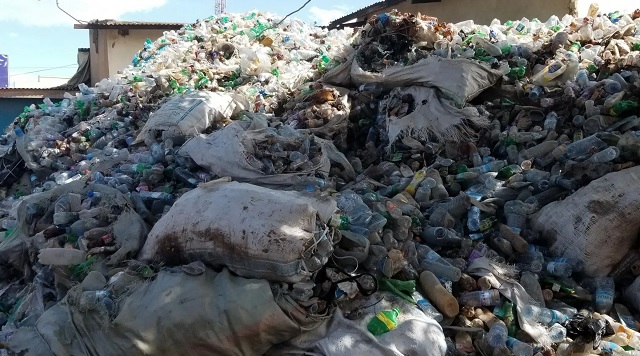
KAMPALA, UGANDA | THE INDEPENDENT | Environmentalist David Kureeba has expressed deep scepticism over renewed efforts by the National Environment Management Authority (NEMA) to impose a total ban on single-use plastic bags, locally known as kaveera, saying such actions lack political backing and remain far from reality.
Kureeba, who is a Senior Program Officer Forests, Biodiversity and climate change at National Association of Professional Environmentalists (NAPE), criticized the environmental authority as “a toothless dog” lacking enforcement power due to insufficient political will.
“Without genuine political commitment, Uganda’s fight against kaveeramay remain a distant dream,” Kureeba warned. “NEMA will continue offering endless lip service without any real enforcement or impact.”
The environmentalist was responding to the latest campaign by NEMA and the Ministry of Water and Environment, launched on Monday in the lead-up to this year’s World Environment Day, themed “United Against Plastic Pollution.”
At the launch event held at the Uganda Media Centre in Kampala, Dr. Barirega Akankwasah, Executive Director of NEMA, announced a renewed push to enforce a total ban on kaveeraand to strengthen the implementation of a voluntary buy-back scheme that encourages manufacturers to collect and recycle used plastic products.
Dr. Barirega added that they are also collaborating with the Ministry of Water and Environment to amend existing legislation—both to formalize the ban on kaveeraand to grant NEMA greater enforcement authority.
Plastic pollution has long been a contentious issue in Uganda. The campaign against kaveera dates back to 2000 when environmental experts, the Ministry of Health, and the Uganda Cancer Institute raised alarms about its health and environmental risks.
In 2010, the government passed a statute prohibiting the manufacture, sale, distribution, and use of polythene bags under 30 microns. However, enforcement has been weak. Although NEMA, with support from police and the Uganda Revenue Authority, attempted to enforce the ban in 2016, the situation quickly regressed.
In 2018 and 2019, during debate on the new Environment Bill, President Yoweri Museveni stalled momentum toward a complete ban, arguing that many Ugandans still rely on plastic bags and that focus should instead be placed on proper management and recycling.
After the legislation was passed, the Cabinet once again resolved to ban kaveera in 2021. However, at the time, NEMA acknowledged that it lacked the legal mandate to enforce the decision under the existing legal framework.
“Until this is revised, implementation of the ban is hard,” Arnold Waiswa Ayazika, who was then serving as Acting Executive Director of NEMA, told Uganda Radio Network.
Kureeba blames a lack of political will and the influence of powerful economic interests for the continued delays. “These are the forces that always push back, and in the end, nothing gets done,” he said. “The other thing to consider is who owns the factories producing these polythene bags,” Kureeba said.
“That alone should tell you how this conversation is likely to end—even if the desired law is passed. We already have many environmental laws and policies, but have the violations stopped? We all know that those breaking these laws are doing so with impunity.”
Nonetheless, the current NEMA leadership insists there is a renewed sense of urgency. Dr. Barirega noted that amendments to the environmental law are being prepared to empower the authority with enforcement capabilities. He also revealed that the voluntary plastic buy-back initiative, now being piloted, may become mandatory shortly, with non-compliant manufacturers facing license revocation.
Regarding PET (polyethene terephthalate) bottles, which are primarily used by beverage companies, he explained that the focus is currently on managing them through buy-back initiatives designed to encourage collection and recycling, rather than pursuing an outright ban.
As Uganda continues to grapple with the kaveera debate, caught between calls for a ban and lingering uncertainty, neighbouring countries like Rwanda and Burundi have already implemented strict bans on the use, manufacture, and importation of polythene bags for both commercial and household purposes.
Globally, plastic waste has reached alarming levels. The United Nations reports that over 430 million tonnes of plastic are produced each year, 66% of which are single-use items like water bottles, food wrappers, and utensils.
In Uganda, NEMA estimates that the country generates 600 metric tonnes of plastic waste daily, with less than 40 percent collected for disposal. In Kampala alone, plastic waste is estimated at 800,000 metric tonnes annually, much of which ends up clogging drainage systems, polluting water bodies, and harming human and animal health.
****
URN
 The Independent Uganda: You get the Truth we Pay the Price
The Independent Uganda: You get the Truth we Pay the Price





